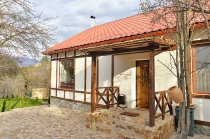
Marriott Tsaghkadzor
The hotel complex "Marriott Tsaghkadzor" offers a comfortable stay in the fresh air of Tsaghkadzor,...
Golden Palace Resort
"Golden Palace Resort-Spa" is the only officially recognized 5-star hotel in Tsakhkadzor, in...
Elegant
Elegant" hotel has stylish rooms where the guests can enjoy picturesque view of mountains and...
Villa Jrhogher
"Villa Jrhogher" is situated in the heart of Dilijan’s forests and is a perfect choice for a small group of friends, colleagues or family members to host up to 10 guests. Free private parking...Venezuela
.jpg&width=410&height=240)
| Capital | Caracas |
| Area | 916 445 km² |
| Population | 28 926 000 people |
| Official language | Spanish |
| Currency | Venezuelan bolivar |
| Climate | In January - from +22°C to +24°C In July - from +10°C to +12°C |
| Recommended type of holiday | Daytimes temperatures during the year range from +30°C to +34°C, and night - from +22°C to +26°C. |
About country
Though best known for its oil politics and feisty president, Venezuela is in fact an action-packed traveller's destination endowed with an astonishing array of landscapes and experiences. Tropical beaches, vast wetlands, great rivers, idyllic colonial towns, little-explored jungle and majestic mountains are among the South American country's varied settings. Visitors can choose from a wealth of adventure activities or just kick back and enjoy the resort experience. The clear, warm waters of its Caribbean coastline and numerous offshore islands are ideal for snorkelling and diving. The tropical lowlands harbour an enormous array of wildlife, lush vegetation and dramatic waterfalls, while high Andean peaks challenge trekkers and mountaineers.
Originally inhabited by Carib and Arawak Indians, Venezuela was claimed as a Spanish territory by Christopher Columbus in 1498. Spanish rule was administered from a distance, leaving the various regions to develop separately from the capital, Caracas. In the 18th century, Simón Bolívar led widespread resistance to colonial meddling, and Venezuela finally became a sovereign state in 1830.Today's politics are dominated by President Hugo Chávez, who draws on the support of the disaffected masses of poor Venezuelans. Despite attempts by the opposition to remove him, Chávez has remained a formidable political force, gaining another six-year term after an overwhelming victory in 2006.
.jpg&width=160&height=120)


Sightseeing
Angel Falls is the tallest waterfall in the world, and, for many, it is also the most stunning: its glistening waters spill into a freefall of nearly one kilometre (0.6 miles) before crashing into a pool. Double rainbows can often be seen in the spray-drenched air above. Located in Canaima National Park, 600km (373 miles) south of Ciudad Bolívar and 50km (30 miles) southeast of Canaima village, the waterfall was made public in 1937 by American pilot Jimmie Angel, who was searching for gold in the area. Angel Falls used to be a holy site for the Incas, and is still sacred to the local Venezuelan tribes today. Tours to the falls can be arranged from the nearest town, Ciudad Bolívar, by boat or plane.
Explore the capital, Caracas, a modern metropolis in a stunning setting along the base of the Ávila range. Besides a fabulously varied culinary landscape, a vibrant cultural life and throbbing nightlife scene, the city also boasts an array of world-class museums.
Check out Colonia Tovar, a slice of Deutschland in the forested mountains west of Caracas. Settled by German immigrants from the Black Forest in the mid-19th century, the town retains its Old World traditions, food and architecture, making for a surreal excursion from the capital.


Traditions
Although Venezuela is a country full of rich cultural traditions very different from each other, not all of them have been neither sufficiently organized nor studied and fully known and appreciated by its people. In some cases, because they are local manifestations of deep features that are only practiced in small and distant populations, in others because, as happens with some dishes of traditional cuisine, its use has been replaced by globalizing customs and practices, and sometimes by sheer ignorance or misinformation sometimes associated with a weak sense of national.
The culture of Venezuela is a crucible which consists of three fundamental families: the indigenous, African and Spanish. The first two had positive cultures as distinct tribes. The acculturation and assimilation, typical of a cultural syncretism, conditioned to arrive at the current Venezuelan culture, similar in many respects to the rest of Latin America, although the natural environment means that there are important differences.

.jpg&width=160&height=120)

Cuisine
The distinctive flavour of comida criolla, as Venezuela's cuisine is locally known, resides in roots and vegetables: yams, yucca, plantains and beans. Beef from the cattle ranches of Los Llanos also figures prominently; it's done a la parilla (charcoal grilled) at the country's many steakhouses. Equally enticing are the varieties of fresh fish and seafood stews prepared along the Caribbean coast. Authentic Italian, Chinese, Spanish and Middle Eastern cuisines are also widely available, thanks to the presence of substantial immigrant communities.
From pineapples to papayas, tropical fruit is fabulously varied and blended into batidos (shakes). Venezuela produces excellent rum and is a major importer of Scotch. Polar (served ice-cold, naturally) is the most popular of several local beers.






